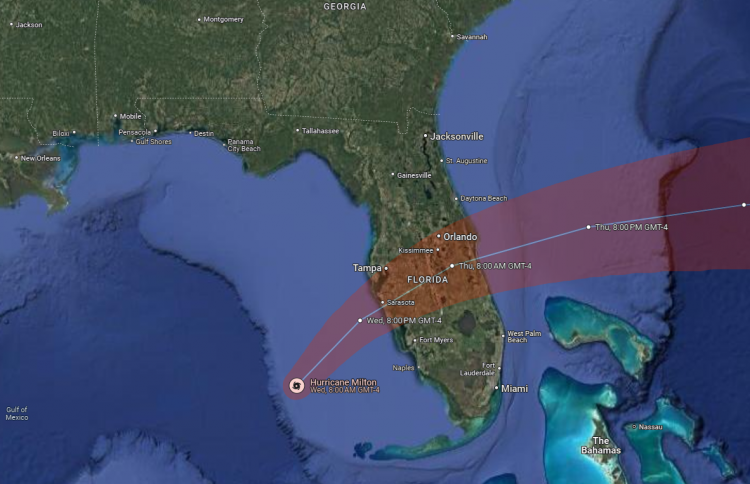Hurricane Milton, described as a "storm of the century," is rapidly approaching Florida's Gulf Coast with a powerful surge, threatening to become one of the most destructive hurricanes in the state's history. The National Hurricane Center (NHC) has warned that Milton could bring up to 15 feet of storm surge to vulnerable communities in the Tampa Bay area as it nears landfall late Wednesday or early Thursday.
Currently a Category 4 storm with sustained winds of about 155 mph (250 km/h), Milton is expected to maintain its intensity as it hits the densely populated region that includes Tampa, St. Petersburg, and Sarasota. The NHC called the storm a "dangerous major hurricane" capable of causing severe damage along Florida's west-central coast.
Florida Governor Ron DeSantis emphasized the seriousness of the situation, stating, "We must be prepared for a major, major impact to the west coast of Florida." He noted that the precise landfall point of the storm remains uncertain but warned that its effects will be widespread.
Mass Evacuations and Concerns over Storm Surge
Authorities have issued mandatory evacuation orders for 11 Florida counties, affecting nearly 5.9 million people. The mayor of Tampa, Jane Castor, delivered a stark warning: "If you are in a single-story home that is hit by a 15-foot storm surge, which means that water comes in immediately, there's nowhere to go. That's the coffin that you're in."
Residents are scrambling to leave the area, facing gridlocked roads and gas shortages. Reports indicated that more than 46% of gas stations in the Tampa-St. Petersburg area were out of fuel as of Tuesday evening, according to GasBuddy analyst Patrick De Haan. "Replenishments are happening," De Haan said, but many stations are still running dry as the demand peaks ahead of the storm.
Communities Still Recovering from Previous Hurricanes
Milton's arrival comes just two weeks after Hurricane Helene swept through the same region, causing widespread flooding and damage. The debris left behind by Helene has raised concerns about potential projectiles during Milton's high winds. More than 1,300 loads of debris have been cleared from the area, according to state officials, but many fear that the clean-up efforts will not be enough to prevent additional hazards.
Kara Doran, a U.S. Geological Survey scientist, highlighted the compounded risk, stating, "The risk of permanent change to the coastline cannot be overstated as communities are more vulnerable to this storm's impacts due to the erosion that occurred recently from Helene."
Extreme Weather and Historical Context
Meteorologists have pointed out the unusual nature of this hurricane season. Phil Klotzbach, a hurricane researcher at Colorado State University, noted the volatility of this year's weather patterns, saying, "From Aug. 20 to Sept. 23, it was record quiet, but then five hurricanes formed between Sept. 26 and Oct. 6 - more than double the old record." Milton itself intensified dramatically from a tropical storm to a Category 5 hurricane in just 46.5 hours.
President Joe Biden, who postponed an overseas trip to stay at the White House and monitor Milton's progress, warned that it "could be one of the worst storms in 100 years to hit Florida." Biden's decision underscores the federal government's heightened focus on disaster response as Florida braces for potentially unprecedented impacts.
Widespread Disruptions in Florida
As Milton approaches, airports across Florida have shut down operations. Tampa International Airport closed Tuesday morning, stating it would not reopen until damage assessments were complete. Orlando International Airport and major theme parks, including Walt Disney World and Universal Orlando, also announced closures in anticipation of the storm's impact.
Residents trying to escape the storm have faced challenges beyond just fuel shortages. "It seems very, very scary, but there's no way to leave," said Ashley Khrais, a resident of Holiday, Florida, expressing the helplessness many Floridians feel as they prepare for Milton's onslaught.
In coastal communities, efforts to protect property with sandbags and by boarding up windows have been ongoing, with the knowledge that Milton could be the most powerful storm the region has ever experienced. "They've seen plenty of storms, but nothing like this," said Jay Gray of NBC News, describing the tense preparations in Fort Myers Beach.
Mexico and Milton's Path Forward
As Hurricane Milton churned through the Gulf of Mexico, its effects were also felt in the Yucatan region of Mexico. Authorities there reported minor damage, including downed power lines and destroyed small structures, but no injuries or deaths, according to Yucatan Governor Joaquín Díaz.
Forecasters expect Milton to move across central Florida and head toward the Atlantic Ocean, potentially impacting the state's east coast with heavy rains and strong winds. The National Weather Service warned of conditions favorable for tornado development, even far from the storm's center, as Milton progresses inland.
Preparing for the Unpredictable
Florida's Gulf Coast remains especially vulnerable to storm surge, a danger that is compounded by the unique geographical features of the area. "It doesn't take much to push water over land that would be dry. It's extremely vulnerable," said Cody Fritz from the NHC storm surge team.
As Floridians brace for Hurricane Milton's landfall, the focus remains on preparedness and safety. The region is on high alert, with local, state, and federal agencies coordinating a massive response effort aimed at minimizing the storm's potentially catastrophic impacts.




